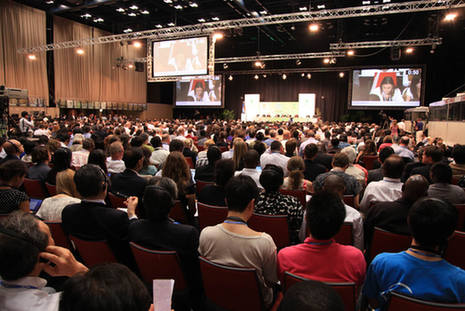| Countries meeting in Durban, South Africa, delivered a breakthrough with promises of real action by the international community to reduce the impact of climate change. Delegations recognized the urgent need to raise collective efforts in reducing greenhouse gas emissions to prevent average global temperatures from rising by more than two degrees Celsius. The Durban talks ended on a high point with a roadmap toward an international climate accord that included all of the world's major carbon emitters for the first time. This accord is to be finalized by 2015 and will take effect from 2020.
Saving Tomorrow at the Durban Conference
By staff reporter WANG SONG
AFTER a two-week marathon of talks, negotiators made significant progress towards a binding agreement in Durban, South Africa, making the conference a landmark event in the fight against climate change.
The conference was officially known as the 17th session of the Conference of Parties (COP) to the United Nations Framework Convention on Climate Change (UNFCCC) and the seventh session of the Meeting of the Parties (MOP) to the Kyoto Protocol. Nearly 30,000 representatives from more than 190 countries attended the event.
 |
|
Attendees listen in as one delegate makes her case at the Durban conference. Photos by Wang Song |
COP17 was scheduled to end on Friday, December 9, 2011. With the deadline looming, several key decisions were yet to have been made. The conference was extended by two days and was finally brought to a close on December 11.
"Today, we have taken crucial steps forward for the common good and for the global citizenry. I believe that what we achieved in Durban will play a central role in saving tomorrow," said Maite Nkoana-Mashabane, the South African minister for international relations and cooperation, and president of the Durban conference.
"I salute the countries that made this agreement. They have all laid aside some objectives of their own to come together with a common purpose – a long-term solution to climate change. I would like to sincerely thank the South African Presidency who steered us through a long and intense conference to arrive at a historic agreement that has addressed all the major issues," said Christiana Figueres, executive secretary of the UNFCCC.
| 